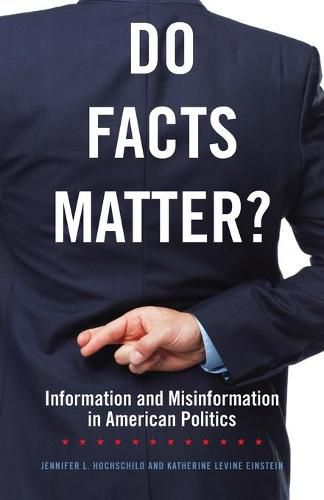Readings Newsletter
Become a Readings Member to make your shopping experience even easier.
Sign in or sign up for free!
You’re not far away from qualifying for FREE standard shipping within Australia
You’ve qualified for FREE standard shipping within Australia
The cart is loading…






A democracy falters when most of its citizens are uninformed or misinformed, when misinformation affects political decisions and actions, or when political actors foment misinformation - the state of affairs the United States faces today, as this timely book makes painfully clear. In Do Facts Matter? Jennifer L. Hochschild and Katherine Levine Einstein start with Thomas Jefferson’s ideal citizen, who knows and uses correct information to make policy or political choices. What, then, the authors ask, are the consequences if citizens are informed but do not act on their knowledge? More serious, what if they do act, but on incorrect information?
Analyzing the use, nonuse, and misuse of facts in various cases - such as the call to impeach Bill Clinton, the response to global warming, Clarence Thomas’s appointment to the Supreme Court, the case for invading Iraq, beliefs about Barack Obama’s birthplace and religion, and the Affordable Care Act - Hochschild and Einstein argue persuasively that errors of commission (that is, acting on falsehoods) are even more troublesome than errors of omission. While citizens’ inability or unwillingness to use the facts they know in their political decision making may be frustrating, their acquisition and use of incorrect
knowledge
pose a far greater threat to a democratic political system.
Do Facts Matter? looks beyond individual citizens to the role that political elites play in informing, misinforming, and encouraging or discouraging the use of accurate or mistaken information or beliefs. Hochschild and Einstein show that if a well-informed electorate remains a crucial component of a successful democracy, the deliberate concealment of political facts poses its greatest threat.
$9.00 standard shipping within Australia
FREE standard shipping within Australia for orders over $100.00
Express & International shipping calculated at checkout
A democracy falters when most of its citizens are uninformed or misinformed, when misinformation affects political decisions and actions, or when political actors foment misinformation - the state of affairs the United States faces today, as this timely book makes painfully clear. In Do Facts Matter? Jennifer L. Hochschild and Katherine Levine Einstein start with Thomas Jefferson’s ideal citizen, who knows and uses correct information to make policy or political choices. What, then, the authors ask, are the consequences if citizens are informed but do not act on their knowledge? More serious, what if they do act, but on incorrect information?
Analyzing the use, nonuse, and misuse of facts in various cases - such as the call to impeach Bill Clinton, the response to global warming, Clarence Thomas’s appointment to the Supreme Court, the case for invading Iraq, beliefs about Barack Obama’s birthplace and religion, and the Affordable Care Act - Hochschild and Einstein argue persuasively that errors of commission (that is, acting on falsehoods) are even more troublesome than errors of omission. While citizens’ inability or unwillingness to use the facts they know in their political decision making may be frustrating, their acquisition and use of incorrect
knowledge
pose a far greater threat to a democratic political system.
Do Facts Matter? looks beyond individual citizens to the role that political elites play in informing, misinforming, and encouraging or discouraging the use of accurate or mistaken information or beliefs. Hochschild and Einstein show that if a well-informed electorate remains a crucial component of a successful democracy, the deliberate concealment of political facts poses its greatest threat.